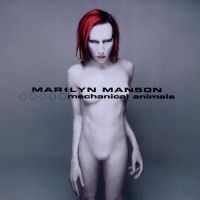
MARILYN MANSON
Mechanical Animals
![]()
Interscope (1998)
Rating: 8/10

|
Following the macabre Antichrist Superstar (October 1996), Marilyn Manson stepped away from his relationship with Nine Inch Nails mastermind Trent Reznor. Enlisting producer Michael Beinhorn (Red Hot Chili Peppers, Soundgarden, Hole), the band relocated to the Hollywood Hills. With its excess of plastic souls, drugs, and paparazzi, the new surroundings provided the ideal locale for the second chapter in Manson’s trilogy of records.
With an unquestionable glam metal sound, Mechanical Animals borrows heavily from David Bowie’s Diamond Dogs (April 1974). Creating characters Alpha (Manson himself) and Omēga (an androgynous alien), Manson’s affinity for Bowie’s alter ego Ziggy Stardust is obvious. The concept this time out intertwines Manson’s own depression and alienation following the aggressive darkness of the Antichrist Superstar era, with that of the over-the-top and drug-induced California lifestyle copped by the movie stars that surround him.
Opener ‘Great Big White World’ and its atmospheric detachment set the stage for the band’s new direction. The swagger of lead single ‘The Dope Show’ is followed by the jagged commercialism of the T. Rex influenced title track. ‘Rock Is Dead’ and its syncopated rhythms are reminiscent of ‘The Beautiful People’ from 1996. But it’s the album’s lighter moments that not only display Manson’s vulnerability as a lyricist, but also shows what it’s like to be human in a confounding world. ‘The Speed Of Pain’ employs synthesized vocals in its chorus to lingering effect, and the poignancy of lines like “Shoot myself to love you / If I loved myself I’d be shooting you” from ‘Fundamentally Loathsome’ keep his penchant for wordplay intact. ‘The Last Day On Earth’ is an otherworldly, apocalyptic keyboard-driven track that encapsulates the theme of Mechanical Animals perfectly: heavy music with a decidedly commercial, synthetic sheen. Closer ‘Coma White’ finishes things on a melancholic note, with Manson reassuring that yearning, chemicals, and perfection are all vanity.
Holy Wood (In The Shadow Of The Valley Of Death (November 2000) found Marilyn Manson return to the semi-destructive mindset the band became known for. But Mechanical Animals was arguably their most accessible effort, and yet another reason to pay attention to the ever-evolving world of the artist formerly known as Brian Warner.
Chad Olson





